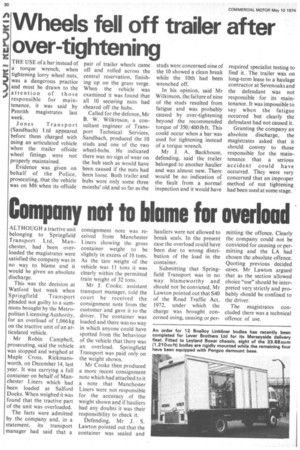Company not to blame for overload
Page 32

If you've noticed an error in this article please click here to report it so we can fix it.
ALTHOUGH a tractive unit belonging to Springfield Transport Ltd, Manchester, had been overloaded the magistrates were satisfied the company was in no way to blame and it would be given an absolute discharge.
This was the decision at Watford last week when Springfield Transport pleaded not guilty to a summons brought by the Metropolitan Licensing Authority, for an overload of 1,066 kg on the tractive unit of an articulated vehicle.
Mr Robin Campbell, prosecuting, said the vehicle was stopped and weighed at Maple Cross, Rickmansworth, on December 14, last year. It was carrying a full container on behalf of Manchester Liners which had been loaded at Salford Docks. When weighed it was found that the tractive part of the unit was overloaded.
The facts were admitted by the company and, in a statement, its transport manager had said that a consignment note was received from Manchester Liners showing the gross container weight to be slightly in excess of 18 tons. As the tare weight of the vehicle was 11 tons it was clearly within the permitted train weight of 32 tons.
Mr J. Cooke, assistant transport manager, told the court he received the consignment note from the customer and gave it to the driver. The container was loaded and there was no way in which anyone could have spotted from the behaviour of the vehicle that there was an overload. Springfield Transport was paid only on the weight shown.
Mr Cooke then produced a more recent consignment note which had attached to it a note that Manchester Liners were not responsible for the accuracy of the weight shown and if hauliers had any doubts it was their responsibility to check it.
Defending, Mr J. S. Lawton pointed out that the container was sealed and hauliers were not allowed to break seals. In the present case the overload could have been due to wrong distribution of the load in the container.
Submitting that Springfield Transport was in no way blameworthy and should not be convicted, Mr Lawton pointed out that S40 of the Road Traffic Act, 1972, under which the charge was brought concerned using, causing or per mitting the offence. Clearly the company could not be convicted for causing or permitting and the LA had chosen the absolute offence. Quoting previous decided cases, Mr Lawton argued that as the section allowed choice "use" should be interpreted very strictly and probably should be confined to the driver.
The magistrates concluded there was a technical offence of use.












































































































































































